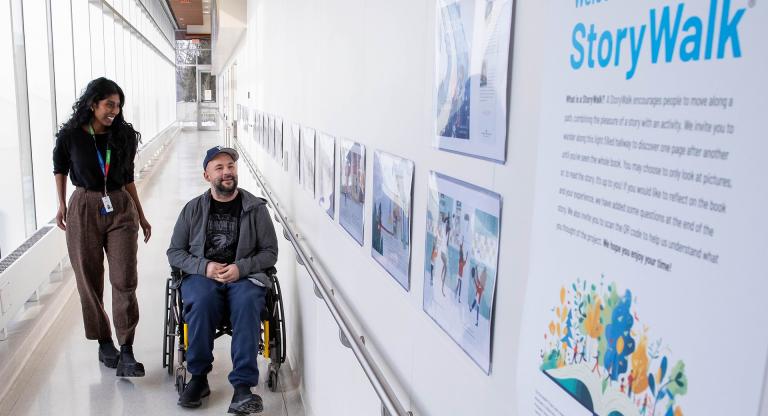Mount Sinai social worker develops innovative approach to using mindfulness in therapy

Bill Gayner, a social worker who works as a mental health clinician in Mount Sinai Hospital’s Psychiatry Department, has developed a unique approach to mindfulness-based therapy. It’s called emotion-focused mindfulness therapy (EFMT) and in February, Bill published his first paper about it in the journal Person-Centred and Experiential Psychotherapies.
“This intervention integrates two forms of therapy that have been around in clinical practice for a long time: mindfulness-based interventions and emotion-focused therapy,” says Bill.
At the heart of this approach is a form of meditation that’s a little different from meditation used in other mindfulness-based therapies. “Meditation in mindfulness-based interventions typically encourages us to acknowledge and accept difficult thoughts and emotions in order to let go of them and focus our attention instead on sensory experience in the present moment,” says Bill. “This helps us to create some space between ourselves and our emotions where we can understand that we’re separate from our emotions and thoughts. In EFMT, we use mindful experiencing to help people explore their thoughts and emotions, integrate thinking and feeling, address and resolve internal conflicts and unfinished business, and cultivate more fulfilling lives both in meditation and therapeutic encounters. This type of exploration is not encouraged in mainstream mindfulness practices. ”
Bill first developed this intervention for his work in the Psychiatry Department’s specialized clinic for HIV related concerns, where he has provided group and individual psychotherapy for 20 years. A randomized controlled trial Bill conducted with Mary Jane Esplen, Peter DeRoche, Jiahui Wong and their colleagues, on mindfulness-based stress reduction groups for gay men living with HIV, inspired him to explore how to integrate self-compassion more deeply into mindfulness to better address internalized stigma.. “This patient population may struggle with issues such as harsh self-criticism, shame, difficulty generating self-warmth, and isolation, as well as related experiences of adverse childhood events that continue to affect their emotional and psychological health,” he adds.
These types of experiences aren’t unique to this patient population, however, and Bill says EFMT has very broad applications. “It’s very common in our culture that people don’t feel comfortable identifying and exploring feelings. We’re rewarded for being able to suppress emotions and needs. This can lead to defensive emotional and cognitive patterns such as worry and anxiety, rumination, depressive feelings, and self-criticism and anger at oneself which can lead to depression and anxiety disorders.”
EFMT is delivered by trained psychotherapists in a group or individual format. It involves journaling and reflecting on thoughts, emotions and sensations that come up during meditation. In the group setting, participants are invited to share their experience and the therapist empathically explores this with them.
Some early research on the intervention by colleagues in the Mount Sinai Academic Family Health Team: Rodelyn Wisco, Cleo Haber and Joanne Permaul, has shown increases in self-compassion and decreases in depression, anxiety and negative affect. Bill hopes to be able to conduct further research and continue expanding the reach of EFMT.
Bill has developed a program for training and mentoring mental health professionals in EFMT. He also provides one-day workshops for Sinai Health System employees in this approach to meditation through Occupational Health’s Healthy Workplace Program, a part of Sinai Health’s People Plan.













